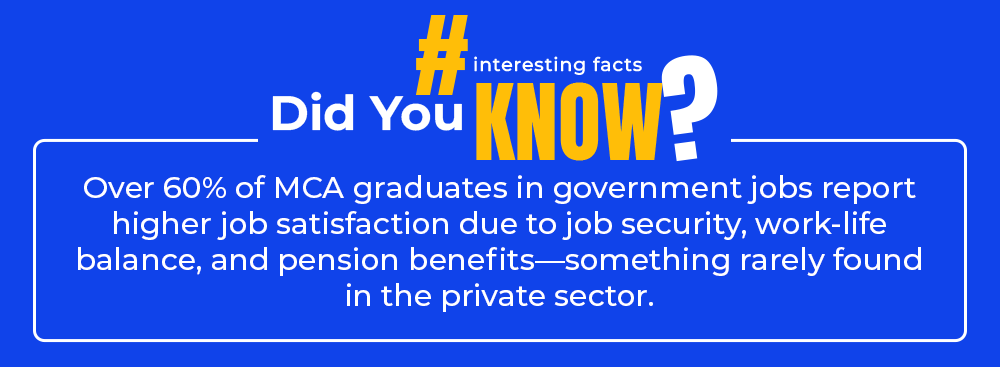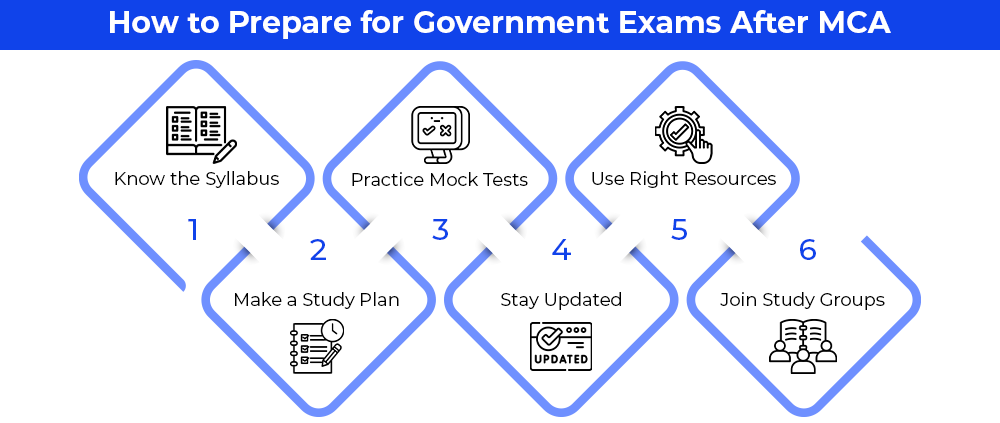Expert Interviews
- University Reviews
- Career Guide
 Video Counseling
Video CounselingImportant Facts
- Ask any Question - CV Forum

How to Get a Government Job After MCA: Explore the Options
Priyanshu Bhatt Jan 20, 2026 1.3K Reads

Getting a government job is a dream of most MCA (Master of Computer Applications) graduates in India who want stability, prestige, and a feeling of service to the population. Various opportunities are made available to the degree itself, and the IT sector remains a pervading force in all modes of governance and public administration.
Skilled professionals in computer applications and information technology are in demand in the central and state-level government departments as well as the public sector undertakings, including the research institutes. All those crucial things about being able to secure a government job once you complete an MCA degree will be explained right here, step by step, in this blog.
Over 60% of MCA graduates in government jobs report higher job satisfaction due to job security, work-life balance, and pension benefits—something rarely found in the private sector.
Why Choose a Government Job After MCA
Working in the government has several benefits, which in most cases cannot be compared to those of the private sector. One of the greatest motivators is job security. A government employee gets to have long-term employment with low chances of unexpected lay-off once recruited.
There is also financial stability of both the pay structure, allowances, and pension benefits. Work-life balance is another big selling point since most state positions have fixed working hours and very generous leave policies. Also, one can work in a government capacity and directly participate in the process of nation-building, especially when it comes to making governance reforms more technology-driven and an initiative towards a digital India.
Eligibility Criteria for Government Jobs After MCA
Most of the government jobs require some academic and age qualifications in order to get the job after studying MCA. The degree in MCA should have been done in a reputed university with a sufficient aggregate of 50-60%, which may depend on the job and the organization. Other positions may also demand other qualifications or certifications, such as in certain programming languages, cybersecurity, or data analytics.
Government norms as per the age limit generally span between 21 to 35 years of age when it comes to the general category candidates, and there are relaxations in the case of the candidates in the reserved category. Some jobs might also require previous knowledge or passing certain entry-level jobs.
Top Government Sectors Hiring MCA Graduates
A number of sectors in the government are undertaking the employment of MCA graduates in different technical and administrative positions. The most notable of these are the public sector undertakings (PSUs), defence organizations, banks and financial institutions, IT organizations within the central and state governments, and education and research institutions. The potential of careers exists in e-governance projects, national informatics centers, and public healthcare information technology.
1. Public Sector Undertakings (PSUs)
Some of the PSUs like BHEL, ONGC, GAIL, NTPC, and IOCL often hire MCA graduates in the roles of software developers, system analysts, database managers, and IT officers. The occupations are highly ranked in terms of their good remuneration packages and social amenities offered to employees. A majority of the PSUs have their recruitment examinations, or they look at GATE scores for the technical jobs. These companies and employment news portals should regularly visit the career departments to find out new employment opportunities.
- Average Salary (Entry Level): ₹6–10 LPA
2. Banking Sector and Financial Institutions
Another area where MCA graduates can get a rich land is the banking sector, especially in positions involving IT infrastructure and cybersecurity. Nationalized banks such as the State Bank of India (SBI), Reserve Bank of India (RBI), etc, recruit IT Officers through competitive exams by IBPS or by their recruitment board. The functions entail activities such as designing banking programs, network administration, data security, and digital transaction maintenance.
- Average Salary (Entry Level): ₹5–9 LPA
3. Defense and Paramilitary Forces
Students of MCA who are more disciplined and inclined to more adventurous jobs can look at the technical jobs in the defense services of India, like the Indian Army, Navy, Air Force, and other paramilitary forces like the CRPF and BSF. These jobs are usually in software development, cryptography, network security, and control and command system management. Technical recruitment typically occurs through examinations such as those of the AFCAT, CDS, or direct recruitment under short service commissions.
- Average Salary (Entry Level): ₹6–8 LPA
4. National Informatics Centre (NIC)
The National Informatics Centre, an agency of the Government of India in the Ministry of Electronics and Information Technology, is responsible for driving digital governance in India. NIC constantly recruits scientists and technical officers holding postgraduate degrees in computer applications or a related discipline. This hiring is usually done with NIELIT, and some of the positions involved are system analysts, software engineers, and project coordinators. This is among the very prestigious and influential jobs in the government that an MCA graduate can aspire to.
- Average Salary (Entry Level): ₹7–10 LPA
5. Indian Railways
MCA graduates are also hired by the Indian Railways, which is one of the largest employers in India for IT-based jobs. Centre of Railway Information Systems (CRIS), which is the principal IT wing of the Railways, recruits employees for the posts of software developers, database administrators, and IT project managers. Recruitment is carried out using the Railway Recruitment Board (RRB) or on a direct recruitment basis.
- Average Salary (Entry Level): ₹5–8 LPA
6. ISRO, DRDO, and Other Research Organizations
ISRO, DRDO, and CSIR are prestigious research organizations that have many career prospects available to MCA graduates. These are mostly research-related positions where one gets to work on with pro advanced computing projects in the areas of space research, defense technology, and scientific computation. One is the written examination, and then the interview; the competition is very tough as these jobs are of high status and very demanding.
- Average Salary (Entry Level): ₹7–12 LPA
7. Educational Institutions and UGC-NET
MCA graduates who are academically focused can opt for a career in teaching and research by appearing in the UGC-NET test successfully. After that, they are able to assume lectureships in colleges and universities or can undergo a PhD to get into research and professor jobs. It is a career that provides intellectual fulfilment and a secure job, particularly in educational institutions managed by the government.
- Average Salary (Entry Level): ₹4–7 LPA
8. E-Governance and Digital India Projects
State and central governments have, under their various programmes, such as Digital India, initiated various IT-based projects that have required skilled personnel. Graduates of MCA have job topics in software development, network administration, analytics of data analytics, and systems security. Such positions may be contractual to start with, but in most cases, they can be absorbed on a permanent basis depending on performance and project demands.
- Average Salary (Entry Level): ₹4–8 LPA
Entrance Exams and Recruitment Processes
After MCA, one will usually get a government job based on competitive examination clearing. The process of recruitment in different sectors and organizations is different. The typical exams are GATE (PSUs), IBPS IT Officer (banks), UGC-NET (teaching), AFCAT, and CDS (defense services), and recruitment tests in NIC, ISRO, and DRDO. In the majority of the exams, aptitude, technical knowledge, general awareness, and the ability to reason are tested. The IBPS IT Officer examination, as one of the examples, involves the reasoning, English, quantitative aptitude, professional knowledge, as well as general awareness with special reference to banking.
Since every exam is different in terms of eligibility criteria and even exam pattern, the candidates must read the official notifications thoroughly to come to any conclusion. Personal interview, technical tests, or group discussions are the final phases of selection in the hands of numerous organizations, too.

How to Prepare for Government Exams After MCA
Studying strategy and concentration is the key to success in government exams. It is the first step a candidate should take to be completely conversant with the syllabus and pattern of the exam. On this basis, they will be able to develop a study plan whereby they will be able to absorb theoretical knowledge as well as acquire the practical skills of solving problems. There should be frequent revisions and mock tests to enhance fast performance and accuracy. One should also keep abreast of current events, particularly in those examinations that have a general awareness component.
Being a part of a coaching institute is helpful in case one requires organized help, but self-studying with the correct materials will work as well. There are numerous websites with free and paid courses, which are suitable with respect to particular government exams. The candidate is also advised to discuss with other candidates and even connect on the internet by following forums where fellow candidates are preparing for the same exams.
Skills to Enhance Employability
Besides academic levels, certain skills can enhance the opportunity of acquiring a government job. Technical positions require a certain level of skills in programming languages like Java, Python, and C++. Knowledge of database management, data analytics, cybersecurity, and cloud computing is also appreciated. Communication skills and solving problems, and working in a team are some of the soft skills that are important during an interview and a group discussion.
Acquiring short-term qualifications in subjects such as computer security, artificial intelligence, or project management would provide the applicants with a cut over the rest. Such certifications show motivation toward lifelong learning and could be required in the particular IT jobs governments might offer.
Challenges and How to Overcome Them
There is a lot of rivalry in employment in government, and most candidates fail severely before they finally succeed. Delays and instability in the recruitment process are one of the major problems and demotivating factors. To keep morale high, candidates must make their goals small and realistic, and should also have a balanced schedule with relaxation and allowance to pursue hobbies.
The next problem is that there is a conflict between job preparation and financial concerns. Some candidates may be required to engage in a part-time job or freelance project preparation. In this instance, time comes to play a big role. It is possible to fix a realistic schedule and adhere to it, which should manage both study and work life.
Leveraging Internships, Projects, and Freelancing Experience
Most of the jobs in the government sector do not necessarily demand any prior job experience; however, it can be a clincher in the neck when one gets some real job exposure. Internships at PSUs, IT startups cooperating in government contracts, or even voluntary contributions to open-source government projects will give MCA students something to put along with their resumes.
Technical capacity and social contribution can be presented in projects with Smart City Solutions, or data mapping dashboards that monitor collective health, or blockchain implementation in land records. Freelancing in other spheres (in the work on secure web applications, optimization of the database, or network security, etc.) may show the same abilities of independence and practical problem-solving abilities, which are appreciated by selectors in interviews and when verifying documents.
Financial Planning and Enrollment During Preparation
Most candidates compromise their finances since they need to attend long government examinations. Luckily, some organizations, such as RCM, can provide you with scholarships or loan packages specifically designed to help MCA students thinking about the government as their sphere of operation. Even certain merit and fortitude-based financial help or fee waiver schemes are offered by some of the central and state governments.
Pursuing online courses may also work to reduce the cost. If you have not enrolled in an MCA program for now, and are planning to opt for government jobs after that. The golden advice you would ever receive is to enroll in an online MCA program because it lets you dedicate your complete time to your studies, and side by side your education will also be completed.
|
Top Online MCA Universities |
||
On the other hand, if you are already doing your MCA from a regular college, then focus on your studies along with your degree, and you will surely excel in your goal.
Conclusion: A Rewarding Career Path
After MCA, obtaining a government job is not a far-fetched idea, but it is very rewarding. The prospects are enormous, and they are spread in various fields such as the defence industry, research, government services, banking, and education services.
Combining adequate portion of academic knowledge, skill development, and proper preparation, graduates of the MCA program may establish themselves on a stable and satisfying career path in the government circle. It is a path which should be approached with patience, perseverance, and vision, but its rewards are worth giving it your juice, though. Be it helping national security, enhancing the level of services through digital platforms, or all the way to cultivating the younger generations in the academic field, the jobs that MCA graduates can engage in are as varied as they are rewarding.
Continue streamlining opportunities, keep yourself aware of recruitment notifications, and work towards preparing yourself. Government job after MCA is a dream that you may get by applying to one application.
FAQs (Frequently Asked Questions)
Yes, many government departments and PSUs hire MCA graduates for IT and technical roles.
Top sectors include PSUs, banks, defense, Indian Railways, NIC, ISRO, and research institutions.
Entry-level salaries range from ₹4 LPA to ₹12 LPA depending on the sector and role.
GATE is required for some PSU jobs, but not mandatory for all government roles.
Common exams include GATE, IBPS IT Officer, AFCAT, CDS, UGC-NET, and specific PSU exams.
Skills in programming (Python, Java), data analytics, cybersecurity, and soft skills like communication help a lot.
Yes, if the degree is from a UGC-entitled and AICTE-approved university.
Absolutely! Many candidates start preparation during their MCA to save time.
It depends on your preparation and opportunities, but 1–2 years of consistent effort is typical.
No, most roles are open to freshers, though internships or projects can boost your profile.

3 Years of Experience | Content Specialist I Copywriter
Writing what Google loves, and students need.
Every query is essential.
Our team of experts, or experienced individuals, will answer it within 24 hours.
Recommended for you
Tired of dealing with call centers!
Get a professional advisor for Career!
LIFETIME FREE
Rs.1499(Exclusive offer for today)

Pooja
MBA 7 yrs exp

Sarthak
M.Com 4 yrs exp

Kapil Gupta
MCA 5 yrs exp
or



Career Finder
(Career Suitability Test)
Explore and Find out your Most Suitable Career Path. Get Started with our Career Finder Tool Now!
ROI Calculator
Find out the expected salary, costs, and ROI of your chosen online university with our free calculator.

